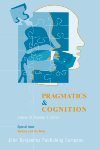
Pragmatics & Cognition
Scope & Guideline
Illuminating the Nuances of Pragmatic Interaction
Introduction
Aims and Scopes
- Pragmatic Analysis of Language Use:
The journal emphasizes the study of how context influences the interpretation of language, including indirect speech acts, metaphor, and irony. - Cognitive Approaches to Language:
Research often incorporates cognitive science perspectives, exploring how language and cognition interact, including studies on children's language acquisition and cognitive processes behind comprehension. - Multimodal Communication:
There is a significant focus on how language interacts with other modalities, such as gesture and visual elements, in conveying meaning. - Cultural and Social Dimensions of Language:
The journal addresses how language varies across cultures and the implications of these variations for intercultural communication and social interaction. - Taboo and Sensitive Language:
Research includes the exploration of taboo language, slurs, and the sociopragmatic aspects of language use, reflecting on how societal norms influence language.
Trending and Emerging
- Intercultural Communication Dynamics:
Research on language variation and the development of temporary norms in intercultural interactions has gained prominence, reflecting a growing interest in how globalization affects communication. - The Role of Non-verbal Communication:
Studies examining gesture, gaze, and other paralinguistic elements in communication are increasingly frequent, emphasizing the multimodal aspects of pragmatic analysis. - Exploration of Taboo Language and Identity,:
There is an emerging focus on taboo language and its implications for identity and societal norms, particularly concerning LGBTQ+ language and reclamation efforts. - Children's Language Development and Pragmatics:
Research on children’s comprehension of complex language features, such as irony and metaphor, is trending, highlighting the cognitive development aspects of language acquisition. - Pragmatics in Digital Communication:
With the rise of digital communication platforms, studies examining the pragmatic implications of online interactions, including memes and other multimodal forms, are becoming more common.
Declining or Waning
- Traditional Theories of Language Structure:
There has been a noticeable decline in papers focusing solely on traditional linguistic structures without consideration of cognitive or pragmatic implications, indicating a shift towards more dynamic, context-driven analyses. - Static Discourse Analysis:
Research that treats discourse as a static entity rather than a dynamic, interactive process has become less prevalent, as the field increasingly favors studies that emphasize interaction. - Focus on Isolated Language Features:
There appears to be a waning interest in studies that isolate specific linguistic features without integrating them into broader pragmatic or cognitive frameworks, reflecting a move towards more holistic approaches.
Similar Journals
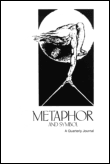
METAPHOR AND SYMBOL
Exploring the Depths of Language and ThoughtMETAPHOR AND SYMBOL is a prestigious journal dedicated to advancing the study of metaphor, symbolism, and their roles in communication and cognition. Published by Routledge Journals, Taylor & Francis Ltd, this journal possesses an impressive reputation, evidenced by its Q1 rankings in both Communication and Linguistics and Language, as well as a Q3 ranking in Experimental and Cognitive Psychology. As of 2023, it holds a notable position in Scopus rankings, standing in the 86th percentile for Social Sciences in Linguistics and Language, making it a vital resource for researchers and professionals interested in the intricate interplay between language and thought. With its convergence years extending from 2007 to 2024, METAPHOR AND SYMBOL aims to publish innovative research that explores the cognitive, communicative, and social aspects of metaphor and symbolism, thereby enriching the academic discourse in its field. While this journal is not open access, its contributions are invaluable to advancing knowledge and understanding in communication, psychology, and linguistics, ensuring it remains an essential read for scholars and students alike.

JOURNAL OF PSYCHOLINGUISTIC RESEARCH
Connecting Language and Thought Through Rigorous InquiryJOURNAL OF PSYCHOLINGUISTIC RESEARCH is a premier scholarly publication dedicated to the interdisciplinary exploration of language and cognition. Established in 1971 and published by Springer/Plenum Publishers, this journal serves as a vital platform for researchers in Experimental and Cognitive Psychology, Linguistics, and related fields. With an impressive reputation reflected in its 2023 Category Quartiles—Q3 in Experimental and Cognitive Psychology, Q1 in Linguistics and Language, and Q2 in Psychology (miscellaneous)—the journal ranks prominently within the Scopus database, reaching the 88th percentile in Language and Linguistics. Researchers and professionals have the opportunity to disseminate their findings effectively, enriching contemporary understanding of psycholinguistic phenomena through rigorous peer-reviewed articles. Although currently not an open-access journal, it provides extensive access options that cater to a global audience, ensuring that the latest research is readily available to those dedicated to advancing this dynamic field. We invite scholars, practitioners, and students to engage with this essential resource for fresh insights and innovative research methodologies.

International Review of Pragmatics
Exploring the Depths of Pragmatic DiscourseInternational Review of Pragmatics is a leading scholarly journal published by BRILL, renowned for its contribution to the fields of Communication, Linguistics and Language, and Psychology. With an ISSN of 1877-3095 and an E-ISSN of 1877-3109, this journal offers a rigorous platform for high-quality research and theoretical contributions that explore the complexities of pragmatics across various domains. Situated in the Netherlands, the journal is currently ranked in the Q2 quartile for both Communication and Linguistics, reflecting its substantial influence and academic excellence. The Scopus rankings further emphasize its importance, with percentile rankings in the 55th to 78th range across several relevant categories. Since its inception in 2014, the journal has consistently pursued the objective of fostering interdisciplinary dialogue and advancing scholarly discourse in pragmatics. Although the journal does not currently offer open access options, it remains committed to accessibility in academia through various channels. Researchers, professionals, and students alike will find valuable insights and contemporary discussions that propel the field forward, making International Review of Pragmatics an essential resource for those dedicated to understanding the intricacies of human communication.
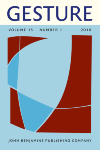
Gesture
Capturing the essence of communication beyond words.Gesture, published by JOHN BENJAMINS PUBLISHING CO, is a leading interdisciplinary journal that focuses on the study of human gestural communication as a rich field for linguistic and cognitive research. With an ISSN of 1568-1475 and an E-ISSN of 1569-9773, the journal has been influential since its inception in 2001, providing a vital forum for researchers and professionals studying the interplay between gesture and language. It significantly contributes to various academic fields, evidenced by its remarkable rankings, including Q1 in Cultural Studies and Q2 in Linguistics and Language as of 2023. While it does not offer Open Access, its high impact in scholarly communication makes it indispensable for anyone wanting to explore the nuances of non-verbal expression. The journal maintains a dynamic scope, converging scholarship from 2001 to 2014 and continuing robustly from 2016 to 2024, solidifying its position in the social sciences sector, particularly in the realms of communication, cultural studies, and cognitive psychology. Gesture is published from the Netherlands, and its esteemed reputation ensures that it attracts contributions from top-tier researchers worldwide, making it a crucial resource for advancing knowledge and understanding in the field.
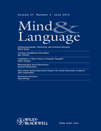
MIND & LANGUAGE
Exploring the Interplay of Thought and ExpressionMIND & LANGUAGE, published by WILEY, is a premier academic journal that has established itself as a leading platform for interdisciplinary research at the intersection of linguistics, philosophy, and cognitive science. With a noteworthy impact factor and a remarkable ranking in the top quartiles (Q1) for both Linguistics and Language as well as Philosophy, it reflects the journal’s robust contribution to the academic community, garnering attention from researchers and scholars worldwide. Since its inception in 1986, MIND & LANGUAGE has provided an avenue for exploring the complexities of language perception, cognitive processes, and the philosophical implications of linguistic studies. Its comprehensive scope ensures that it remains a critical resource for professionals and students alike who are engaged in the exploration of language's role in human thought and society. The journal's rigorous peer-review process guarantees the high quality and scholarly integrity of the published work, making it an essential addition to any academic library.
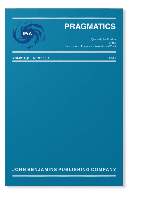
Pragmatics
Shaping the future of linguistic and philosophical discourse.Pragmatics is a premier international journal dedicated to the exploration and development of the field of pragmatics, published by John Benjamins Publishing Co. This esteemed journal, with an ISSN of 1018-2101 and E-ISSN 2406-4238, offers a vital platform for interdisciplinary research in linguistics, philosophy, and social sciences, making significant contributions to scholarly discourse since its convergence in 2005. Recognized for its high-impact research, Pragmatics boasts a prestigious Q1 ranking in both Linguistics and Language and Philosophy as of 2023, with impressive Scopus rankings that place it in the top percentiles of its categories. The journal aims to enhance understanding of communication in diverse contexts and encourages submissions that reflect innovative theoretical perspectives and empirical findings. Although not an open-access journal, it is essential for researchers, professionals, and students seeking to stay at the forefront of pragmatic studies and related disciplines. With its base in Belgium and an address in Amsterdam, Pragmatics continues to influence global conversations in the humanities and social sciences.
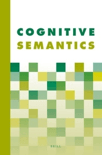
Cognitive Semantics
Diving Deep into the Semantics of ThoughtCognitive Semantics, published by BRILL, is a leading academic journal dedicated to the intricate study of cognitive processes underlying language use and semantic meaning. With its ISSN 2352-6408 and E-ISSN 2352-6416, this journal contributes significantly to the fields of linguistics and language studies, reflecting its importance in contemporary research on cognitive linguistics. Over its publication span from 2015 to 2024, it has established a niche as a Q3 ranked journal in the Linguistics and Language category for 2023, showcasing its relevance and growing influence in the academic community. Although currently not open access, the journal aims to provide a robust platform for exchanging ideas, theories, and methodologies related to cognitive semantics, fostering interdisciplinary dialogue among researchers, professionals, and students. Readers can expect to uncover valuable insights into the cognitive mechanisms that shape our understanding of language, making this journal an essential resource for anyone involved in linguistic research.
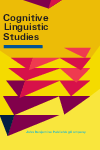
Cognitive Linguistic Studies
Pioneering Research at the Intersection of Language and CognitionCognitive Linguistic Studies is a prestigious journal published by JOHN BENJAMINS PUBLISHING CO, dedicated to advancing the interdisciplinary field of cognitive linguistics. With an ISSN of 2213-8722 and an E-ISSN of 2213-8730, the journal serves as an essential platform for the dissemination of high-quality research that delves into the intricate relationships between language, thought, and cultural contexts. Located in the vibrant academic milieu of the Netherlands, this journal has gained recognition for its impactful contributions, reflected in its respectable Q2 category ranking within the field of Linguistics and Language as of 2023. Redesigned to accommodate a broader audience, the journal welcomes original research articles, reviews, and theoretical discussions that bridge cognitive science and linguistic inquiry. As the journal continues its trajectory of growth, being indexed with a solid Scopus rank of #459 out of 1167 in the social sciences, it remains a vital resource for researchers, professionals, and students eager to explore the dynamic interplay between cognition and language.

Language and Cognition
Elevating Scholarship in Language and Cognitive PsychologyLanguage and Cognition is a premier peer-reviewed journal published by Cambridge University Press, dedicated to advancing the fields of language, linguistics, and cognitive psychology. With an ISSN of 1866-9808 and E-ISSN of 1866-9859, it has rapidly established itself as a pivotal resource for researchers, educators, and practitioners alike. Recognized for its rigorous scholarship, the journal holds a Q1 ranking in Linguistics and Language and a Q2 ranking in Experimental and Cognitive Psychology for 2023, reflecting its esteemed positioning within the academic community. Since transitioning to open access in 2023, it has broadened its reach, making cutting-edge research accessible to a global audience. The journal's emphasis on interdisciplinary studies ensures a comprehensive exploration of the interactions between language and cognitive processes, fostering deeper insights and fostering collaboration across domains. Researchers and professionals looking to stay at the forefront of advancements in these vital areas will find Language and Cognition an invaluable platform for disseminating their findings and engaging with contemporary debates.
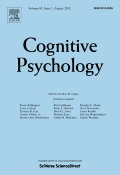
COGNITIVE PSYCHOLOGY
Charting New Territories in Human CognitionCOGNITIVE PSYCHOLOGY is a premier academic journal published by Academic Press Inc. Elsevier Science, specializing in the dynamic and evolving field of cognitive psychology. With a significant history spanning from 1970 to 2024, this journal has established itself as a critical resource for researchers and professionals alike, boasting a distinguished ranking in the Q1 category across multiple disciplines, including Experimental and Cognitive Psychology, Neuropsychology, and Artificial Intelligence. Its impact factor, reflective of its influence and reputation within the academic community, positions COGNITIVE PSYCHOLOGY as an essential platform for disseminating cutting-edge research and theoretical advancements. Although it is not open access, subscribers gain exclusive insights into the latest findings that drive the field forward. The journal's commitment to fostering innovative research makes it an indispensable tool for those dedicated to understanding the complexities of human cognition.